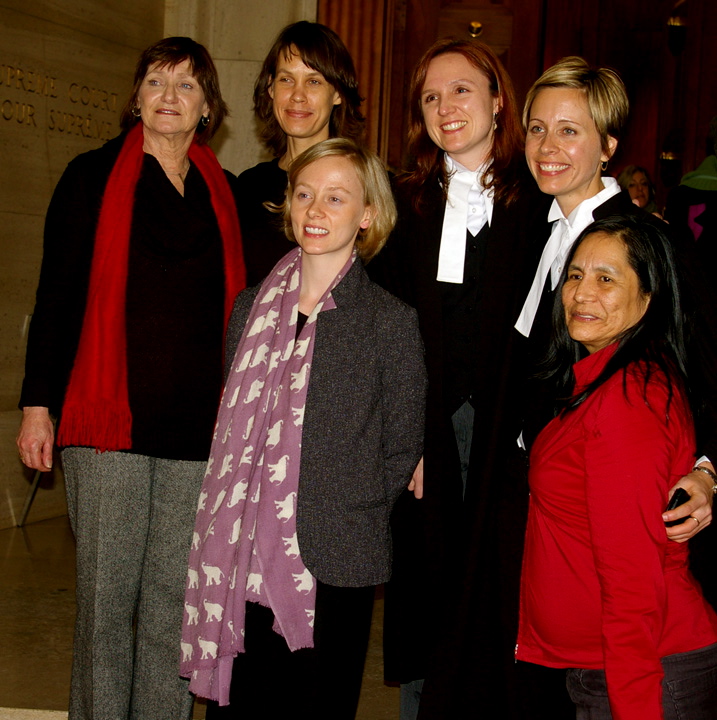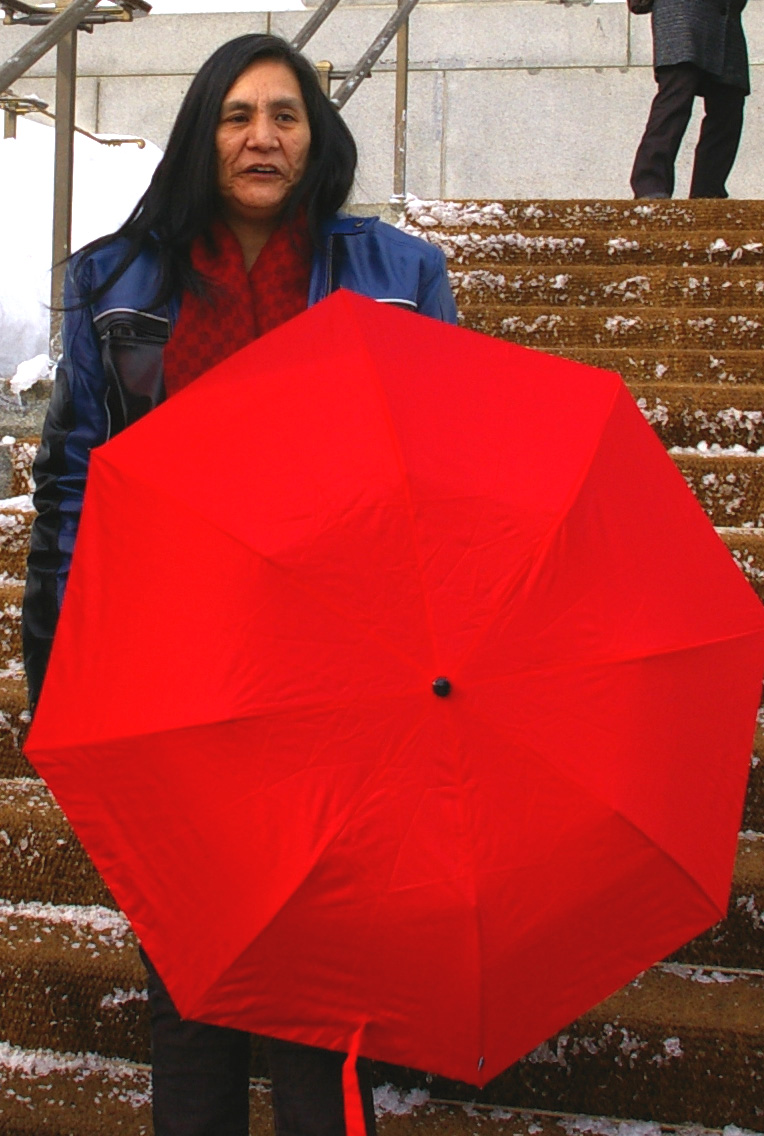On June 12, 2013 Canada’s highest court will hear the matter of Attorney General of Canada, et al. v. Terri Jean Bedford, et al. Pivot, Sex Workers United Against Violence (SWUAV) and PACE asked the Supreme Court of Canada for permission to be there to ensure that the voices and realities of street-based sex workers from the Downtown Eastside inform the Court’s decision, which will have profound implications for sex workers across the country.
Get Updates
Using the law as a catalyst for positive social change, Pivot Legal Society works to improve the lives of marginalized communities.
Case background
This case began in 2007 when three sex workers in Ontario brought a constitutional challenge to the Criminal Code provisions that prohibit keeping common bawdy houses as it relates to prostitution (the “Bawdy House Law”), living off the avails of prostitution (the “Procuring Law”) and communicating for the purpose of prostitution (The “Communication Law”).
In September 2010, the Ontario Superior Court struck down all three provisions on the basis that they violate the Charter of  Rights and Freedoms. The federal government appealed that decision to the Ontario Court of Appeal. Last year, that court agreed that the Bawdy House and Procuring Laws are unconstitutional as written, but reversed the lower court’s decision on the Communication Law. The federal government is now again appealing the decision on the Bawdy House and Procuring Laws and the Bedford Applicants are cross-appealing the decision on the Communication Law. Pivot, SWUAV and PACE intervened at the Ontario Court of Appeal and this coalition has now formally filed for leave from the Supreme Court of Canada to intervene in the case.
Rights and Freedoms. The federal government appealed that decision to the Ontario Court of Appeal. Last year, that court agreed that the Bawdy House and Procuring Laws are unconstitutional as written, but reversed the lower court’s decision on the Communication Law. The federal government is now again appealing the decision on the Bawdy House and Procuring Laws and the Bedford Applicants are cross-appealing the decision on the Communication Law. Pivot, SWUAV and PACE intervened at the Ontario Court of Appeal and this coalition has now formally filed for leave from the Supreme Court of Canada to intervene in the case.
So what exactly does intervention mean?
An intervention is a process through which an individual or a group who is not a party to a particular piece of litigation can play a role in the hearing of the case. The basic rationale for intervention is that the outcome of a particular case may affect the rights of people beyond the parties to the litigation. Those people (or organizations that represent them) should therefore have the right to be heard.
While there are some exceptions, in general, it is within the discretion of the court to allow or refuse an application to intervene. The basic test for when the court should grant leave to intervene is that the person or organization has a genuine interest in the matter under review by the Court, that the Court believes the intervener will make submissions that are pertinent and useful to the proceedings and that those submissions will differ from those of the parties to the appeal, without expanding the issues under review in the case.
Our coalition’s interest in the case
Pivot, SWUAV, PACE each have a clear interest in the outcome of this case. All three organizations are mandated to work to advance the safety, well-being and human rights of sex workers. All three organizations have unique and specialized knowledge about the impacts of the Prostitution Laws on sex workers lives as a result of decades of collaboration and direct service to the sex work community, as well as through their directors, members and/or staff. SWUAV is a sex worker-led organization that is dedicated to creating social change for sex workers in the DTES and throughout Canada. SWUAV’s board of directors and  membership are entirely composed of current and former sex workers who live and/or work in the DTES. SWUAV’s members have experienced a number of harms resulting from criminalization, including increased stigma and vulnerability to violence and diminished access to police protection. For almost 20 years, PACE has carried out its mission to promote safer working conditions for sex workers by reducing harm and isolation through education and support. All of PACE’s programs and services are led and delivered by current and former sex workers. As a legal advocacy organization, Pivot brings extensive experience working with sex workers and as counsel for public interest litigants and as an intervener in public interest litigation.
membership are entirely composed of current and former sex workers who live and/or work in the DTES. SWUAV’s members have experienced a number of harms resulting from criminalization, including increased stigma and vulnerability to violence and diminished access to police protection. For almost 20 years, PACE has carried out its mission to promote safer working conditions for sex workers by reducing harm and isolation through education and support. All of PACE’s programs and services are led and delivered by current and former sex workers. As a legal advocacy organization, Pivot brings extensive experience working with sex workers and as counsel for public interest litigants and as an intervener in public interest litigation.
Of particular relevance to this case, SWUAV and Pivot are currently engaged in litigation in British Columbia that could be affected by the outcome of these appeals given the number of overlapping issues. The case of Canada (Attorney General) v. Downtown Eastside Sex Workers United Against Violence Society, began in the same year as Bedford but was side-tracked by questions over the group’s standing to bring forward the Constitutional Challenge, which have since been resolved in favour of SWUAV.
Our coalition’s distinctive and relevant contribution
SWUAV, PACE and Pivot joined forces to intervene in the Bedford case when it was before the Ontario Court of Appeal, and our coalition hopes to replicate and expand the role it played at that hearing. The litigants in the Bedford case are not primarily involved in street-level sex work, whereas SWUAV is made up of mainly street-based sex workers and PACE and Pivot both work closely with street-based sex workers. Street-based sex workers, particularly those working in Vancouver’ Downtown Eastside, have a unique experience, given the tragic violence that has taken place in the DTES and the consequences of a history of rigorous enforcement of the Prostitution Laws in that community. This expertise and experience will ensure that our coalition provides a useful and distinct perspective on the impact of the Prostitution Laws that will be of assistance to the court.
Our coalition’s argument
If granted leave to intervene, our coalition will ask the court to uphold the Ontario Superior Court’s decision to strike down all three sections of the Criminal Code that were challenged. We will focus our submissions and time before the court (which, if granted, will likely be limited to 10 minutes) on bringing forward the unique perspectives of street-based sex workers as they relate to the prostitution laws and particularly to the “Communication Law”.
We will make the case that the Communications Law infringes s. 7 of the Charter. We will argue that the majority at the Court of Appeal committed two errors when it overturned the lower court’s decision to strike down this provision of the Criminal Code. First we will direct the Court to evidence in the record that suggests that the Court of Appeal erred in its assessment that striking down s. 210 (as it relates to common bawdy-houses kept or occupied or resorted to for the purpose of prostitution) is sufficient to address the harms caused by the Communication Law. With the bawdy-house provision struck down, some sex workers would move entirely indoors in order to reduce exposure to violence. However, as the Court of Appeal’s majority and dissenting judgments both recognized, some street-based sex workers would not be able to move indoors. We will also argue that the majority erred in ruling that the Communication Law’s infringement of the security of the person and liberty interests accords with the principles of fundamental justice, in particular finding that the infringement is not grossly disproportionate, arbitrary or overbroad and that the evidence before the court demonstrates a range of meaningful and effective strategies that would improve Street-based Sex Workers’ safety if they were not subject to the prohibitions created by the Communication Law.
What’s next?
Pivot, SWUAV and PACE have requested that the Supreme Court grant the Coalition leave to intervene in this appeal; to file a factum (a written submission) and to present oral argument at the hearing of the appeal. So now we wait, over the next few weeks more applications for intervention will be filed by other organizations from across the country. If our application is accepted we will prepare for the trip to Ottawa with members of our legal team and women from SWUAV and PACE. We’ll keep you posted.


